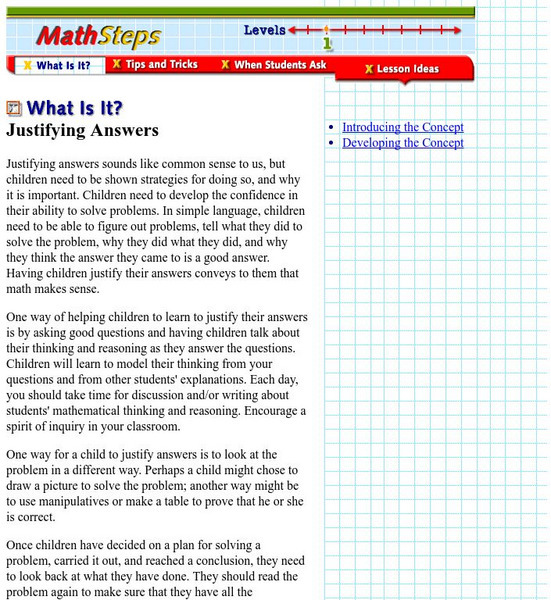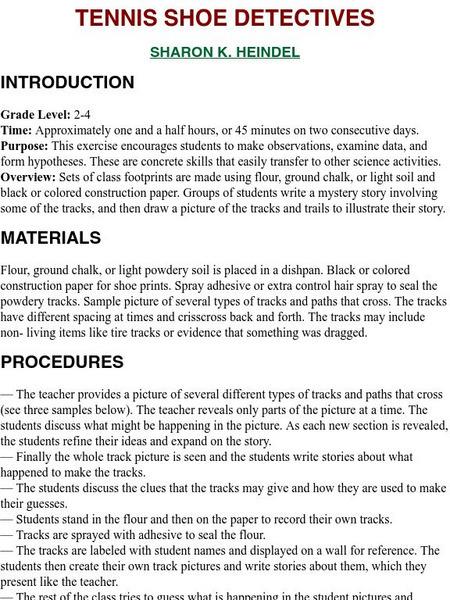Biology 4 kids
Biology4 Kids: Logical Reasoning
Learn how logic and reasoning play a part in everyday thinking, and how deductive and inductive reasoning leads investigators to conclusions.
Khan Academy
Khan Academy: Conditional Reasoning and Logical Equivalence
How do we recognize logically equivalent conditional statements? Conditional (or "if-then") statements can be difficult to master, but your confidence and fluency on the LSAT will improve significantly if you can recognize the various...
Other
Nz Maths Problem Solving Lesson Plans: Level 1
NZMaths, a New Zealand teacher resource, provides lesson plans for students in algebra, geometry, measurement, numbers, statistics, logic and reasoning.
Texas A&M University
Wtamu Virtual Math Lab: Beginning Algebra: Reasoning Skills
A tutorial on reasoning skills focusing on both inductive and deductive reasoning. Has several examples and exercises with answers and discussion.
Khan Academy
Khan Academy: Identify the Conclusion Quick Guide
The resource from Khan Academy provides practice questions for the LSAT. This section provides quick guide on "how to identify a conclusion in a line of reasoning" in the "Logical Reasoning" section.
Khan Academy
Khan Academy: Identify the Conclusion Learn More
The resource from Khan Academy provides practice questions for the LSAT. This section provides quick guide on "how to identify the main conclusion of an argument" in the "Logical Reasoning" section.
Illustrative Mathematics
Illustrative Mathematics: 7.rp Robot Races
This lesson plan allows students to explore proportional relationships using information from robot races.
Lumen Learning
Lumen: Academic Argument: Logical Fallacies
This introduction defines logical fallacies and lists reasons to avoid them. Click next at the bottom of each page for more information about fallacies.
Education Place
Houghton Mifflin: Eduplace: Justifying Answers
Justifying answers, easy enough to an adult, can be difficult for a child. This is a great place to help you teach the concept of "reasonableness" of an answer. There are sections covering lesson plans, tips & tricks, and...
TED Talks
Ted: Ted Ed: Can You Solve the Temple Riddle?
Your expedition finally stands at the heart of the ancient temple. But as you study the inscriptions in the darkness, two wisps of green smoke burst forth. The walls begin to shake. The giant sandglass begins flowing with less than an...
University of California
Ucmp: Understanding Science: Tennis Shoe Detectives
A lesson where students take copies of their shoe prints, then create a story and illustrate it with pictures showing trails of footprints. Presented are samples of such trails that can be used to stimulate class discussion, and to...
US Department of Education
Helping Your Child Learn Math: Math for the Fun of It
This compilation of math activities engages parents and children in the use of math whenever they are at home. Packed with concise, high interest activities, related illustrations, detailed "parent pointers," and easy to following...
Khan Academy
Khan Academy: Strongly Supported Inferences Quick Guide
A quick guide to approaching questions that ask you to identify something that is "strongly supported." On questions that ask you to find the choice that is most strongly supported by a stimulus, the answer does not have to be...
Khan Academy
Khan Academy: Identify the Role Quick Guide
A quick guide to approaching questions that ask you to "identify the role" a piece of the argument is playing. This question asks you to describe the individual role that a statement is playing in a larger argument.













